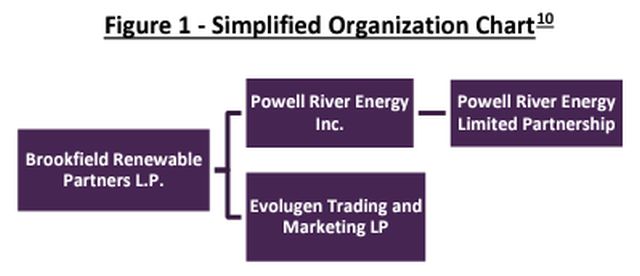In Decision and Order G-332-23 the British Columbia Utilities Commission ("BCUC") found that, by selling power generated at two hydroelectric facilities in British Columbia to the United States through a chain of affiliated companies, Powell River Energy Inc. ("PREI") fell within the definition of a "public utility" under section 1 of the Utilities Commission Act ("UCA"). The BCUC's decision confirms that it will not treat affiliates, which are separate legal entities, as one and the same and that inter-affiliate energy transactions may result in an entity being subject to regulation by the BCUC.
Background
PREI began selling electricity to an affiliated company, Powell River Energy Limited Partnership ("PRELP"), who would then transfer the title to Evolugen Trading and Marketing LP ("ETM") for export to the United States. As shown in the figure reproduced in the Decision, PRELP is a wholly-owned subsidiary of PREI, and ETM, like PREI, is a wholly-owned subsidiary of Brookfield Renewable Partners L.P.

The BCUC regulates public utilities in British Columbia in accordance with the provisions of the UCA. Persons that own or operate equipment or facilities that provide energy services and products for compensation in BC are defined as "public utilities" under section 1 of the UCA, unless: (1) expressly excluded from the definition; or (2) granted an exemption from regulation (the UCA contains provisions which allow for the BCUC and the Minister of Energy, Mines and Low Carbon Innovation to grant exemptions from the UCA; PREI had previously applied to the BCUC for a partial exemption from regulation under the UCA before subsequently withdrawing its application). Section 1 of the UCA provides in part:
"public utility" means a person, or the person's lessee, trustee, receiver or liquidator, who owns or operates in British Columbia, equipment or facilities for
(a) the production, generation, storage, transmission, sale, delivery or provision of electricity, natural gas, steam or any other agent for the production of light, heat, cold or power to or for the public or a corporation for compensation, or ...
...
but does not include
...
(d) a person not otherwise a public utility who provides the service or commodity only to the person or the person's employees or tenants, if the service or commodity is not resold to or used by others,
PREI argued that its operations and circumstances excluded it from the definition of a "public utility" under the UCA on the basis of the exclusion in (d) of the definition of public utility. In particular, PREI argued that its sale of power to PRELP amounted to an "inter-organization sale" as PRELP and ETM were all subsidiaries of the same parent company. To support this argument, PREI made the following points:
- Reference to a "person" in the exclusion in (d) of the definition of public utility under the UCA must reasonably be read as referring to circumstances where the seller and buyer are affiliated entities within the same corporate organization;
- Electricity that was ultimately transferred to ETM (after being sold by PREI to PRELP) was directly exported (i.e., not sold to the public or end-use customers in British Columbia) and was, therefore, beyond the BCUC's jurisdiction;
- The regulatory protection provided by the UCA was not needed as the transaction between PREI and PRELP was between "sophisticated, commercial" parties; and
- PREI would remain subject to regulation by other government agencies despite being excluded from regulation under the UCA.
The BCUC Decision
The BCUC concluded that PREI met the statutory definition of a public utility under the UCA and did not fall within the exclusion in (d) of the definition of public utility.
In interpreting the definition of public utility under the UCA, the BCUC determined that PREI and its subsidiary PRELP were each a standalone "person", citing the definition of a "person" set out in section 29 of the Interpretation Act:
"person" includes a corporation, partnership or party, and the personal or other legal representatives of a person to whom the context can apply according to law.
The BCUC rejected PREI's argument that use of the word "person" twice in (d) of the definition "in any way empowers the BCUC to broaden the definition of person to include corporate affiliates". Put simply, PREI was selling power to a separate corporate entity and not itself, as contemplated by the exclusion.
The BCUC went on to confirm that even if PREI and PRELP were considered a single "person" under the UCA, the electricity generated at the facilities was ultimately "used by others" (i.e., exported to customers the United States) and, therefore, also failed to meet the conditions of the exclusion.
Conclusion
The BCUC's analysis demonstrates that affiliate transactions are not immune from public utility regulation in British Columbia. Where a person meets the statutory definition of a "public utility" in the UCA, and is not otherwise excluded or exempted, they will be subject to BCUC regulation and the BCUC will not treat affiliates, which are separate legal entities, as one and the same.
The content of this article is intended to provide a general guide to the subject matter. Specialist advice should be sought about your specific circumstances.


